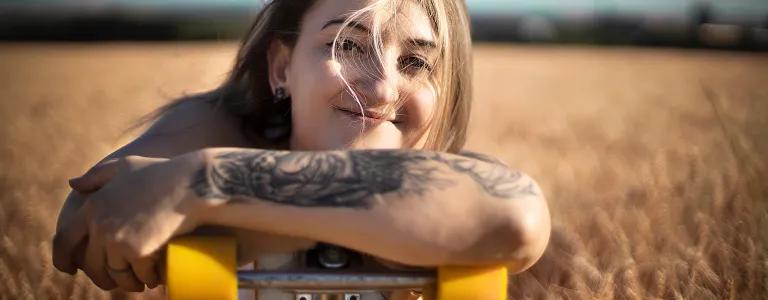
Identity: How do you express your individuality?
Personal expression can take many forms. From interests like art and music, to how you style your hair and clothes, identity is unique to everyone. We asked our grads what it means to them...
“I express myself through music,” says James. “Whether I’m playing it, writing it or even just listening to it. I find it a great way to reflect and understand myself better, so that I can show other people who I am as well.”
“I love to paint and sing,” says Shanzeh, echoing James’ comments. “I even founded my school's first ever acapella group.” Although, for her, clothing is another important way to claim her identity and tell the world who she is. “I love to stand out – any bright colours, especially pink – and wearing my hijab proudly allows me to not only identify as a Muslim, but as someone who isn't afraid of what others think of her.”

There are as many ways to state your individuality as there are people in the world, and feeling good in what you’re wearing can be about comfort as well as what it looks like. “I like to wear plain shirts and black joggers as it makes me feel comfortable,” says Jamie. “Although I wear colourful wristbands to add flair to how I look. It acts as a trademark.”
In an age that often focuses on appearances, so many of you guys told us this wasn’t your first priority when it came to feeling like you.
“To express my identity, I volunteer,” says Daisy. “For example, I run activities for young people, am on the NCS National Youth Board and also volunteer at a brain injury rehabilitation centre.”
And she’s not alone in feeling like herself when she’s helping out. “Throughout my childhood, I’ve always loved to help people and show them they’re not helpless,” says Caitlin. “I show this by volunteering, posting quotes on social media and just trying to get involved – putting myself out there, showing people that I love myself.”

For others, the online world has provided opportunities to express sides of themselves they don’t feel like they can in real life. Ibrahim had skin grafts on his hands as a child that made him feel self-conscious, but through social media he has found some amazing connections.
“I’ve met a lot of people online and have made life-long friendships,” he says. “People on the Internet don’t care who you are. You can be accepted no matter how you look, or what your individuality is – everyone is different. For me, YouTube has been the most effective way to express myself because I’m usually quiet when talking to people in person, but on YouTube I can speak how I want, so I can show who I am – and people accept me there.”

Pretty much all of us act differently depending on who we’re around. We might feel 100% confident with our friends and family, but then around others… not so much.
“I express my identity when I’m around those who I’m comfortable with, when I can speak without filtering myself and effectively project my personality.” says Mudit.
We all go through periods when we doubt ourselves, when we think “maybe I should be less me”? But Mudit thinks that’s missing the point.
“I find it weird how often I am scared to act as me,” he says. “For some reason, a lot of us feel being ourselves can be embarrassing. It isn't always easy, but when I feel like that, I try to think: if people are going to judge me, they might as well just judge me for being the real me. In a way, that’s the point: everyone is embarrassing in their own way, but what makes you embarrassing is what makes you unique and awesome too.”


